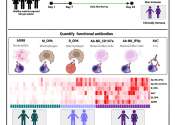Route to more effective malaria vaccines revealed through human-challenge trials
Infecting volunteers with malaria reveals why some get sick and others don't—and points to ways to induce stronger immunity through vaccination.
Jul 30, 2024
0
19
Infecting volunteers with malaria reveals why some get sick and others don't—and points to ways to induce stronger immunity through vaccination.
Jul 30, 2024
0
19

Health workers in Ivory Coast began giving children the latest malaria vaccine on Monday, the beginning of a regional campaign that experts hope might curb the impact of one of Africa's top killers.
Jul 15, 2024
0
0

Scientists have successfully tested a new approach for a malaria vaccine in animal experiments. They used genetically modified malaria parasites that developed normally in the mosquito but at a significantly slower rate in ...
Aug 6, 2024
0
0

Malaria is a mosquito-borne infectious disease of humans and other animals caused by eukaryotic protists of the genus Plasmodium. The disease results from the multiplication of Plasmodium parasites within red blood cells, causing symptoms that typically include fever and headache, in severe cases progressing to coma or death. It is widespread in tropical and subtropical regions, including much of Sub-Saharan Africa, Asia, and the Americas.
Five species of Plasmodium can infect and be transmitted by humans. Severe disease is largely caused by Plasmodium falciparum while the disease caused by Plasmodium vivax, Plasmodium ovale, and Plasmodium malariae is generally a milder disease that is rarely fatal. Plasmodium knowlesi is a zoonosis that causes malaria in macaques but can also infect humans.
Malaria transmission can be reduced by preventing mosquito bites by distribution of mosquito nets and insect repellents, or by mosquito-control measures such as spraying insecticides and draining standing water (where mosquitoes breed). Despite a clear need, no vaccine offering a high level of protection currently exists. Efforts to develop one are ongoing. A number of medications are also available to prevent malaria in travelers to malaria-endemic countries (prophylaxis).
A variety of antimalarial medications are available. Severe malaria is treated with intravenous or intramuscular quinine or, since the mid-2000s, the artemisinin derivative artesunate, which is superior to quinine in both children and adults. Resistance has developed to several antimalarial drugs, most notably chloroquine.
There were an estimated 225 million cases of malaria worldwide in 2009. An estimated 655,000 people died from malaria in 2010, a 5% decrease from the 781,000 who died in 2009 according to the World Health Organization's 2011 World Malaria Report, accounting for 2.23% of deaths worldwide. Ninety percent of malaria-related deaths occur in sub-Saharan Africa, with ~60% of deaths being young children under the age of five. Plasmodium falciparum, the most severe form of malaria, is responsible for the vast majority of deaths associated with the disease. Malaria is commonly associated with poverty, and can indeed be a cause of poverty and a major hindrance to economic development.
This text uses material from Wikipedia licensed under CC BY-SA